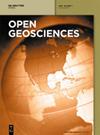Monitoring drought dynamics using remote sensing-based combined drought index in Ergene Basin, Türkiye
IF 1.7
4区 地球科学
Q3 GEOSCIENCES, MULTIDISCIPLINARY
引用次数: 0
Abstract
Remote sensing-based approaches have gained widespread usage in drought monitoring studies. However, relying on single-variable drought indices may be inadequate to provide a comprehensive understanding of drought dynamics. In this study, principal component analysis was employed to derive a combined index, namely, the combined drought index (CDI), from multiple indices such as vegetation condition index, temperature condition index, precipitation condition index, and soil moisture condition index. The CDI was subsequently employed to analyze drought occurrences in the Ergene Basin-Türkiye period from 2001 to 2020 (May to October) using MODIS data. Correlations were computed with standardized precipitation index (SPI) and standardized precipitation evapotranspiration index (SPEI) at 1-, 3-, and 6-month scales and crop yield. The results revealed that drought incidents transpired in the Ergene Basin for at least 1 month annually. May exhibited the wettest, while September stood as the driest month. The severity of drought and its spatial extent displayed an increasing trend followed by a subsequent decline during the aforementioned period. The CDI demonstrated stronger correlations with the 1-month standardized indices than the 3- and 6-month SPI-SPEI. A robust correlation of 0.79 was also observed between the CDI and the crop yield. In general, the CDI performed well in determining the spatial and temporal patterns of the historic droughts. As a result, the CDI could be leveraged to develop effective drought monitoring and management, which could help mitigate the negative impact of drought in the fragile environment of the Ergene Basin.利用基于遥感的综合干旱指数监测土耳其埃尔金盆地的干旱动态
基于遥感的方法在干旱监测研究中得到了广泛应用。然而,依靠单一变量的干旱指数可能不足以全面了解干旱动态。本研究采用主成分分析法,从植被状况指数、温度状况指数、降水状况指数和土壤水分状况指数等多个指数中得出一个综合指数,即综合干旱指数(CDI)。随后,利用 MODIS 数据,利用综合干旱指数分析了 2001 年至 2020 年(5 月至 10 月)期间埃尔金盆地--土耳其的干旱发生情况。计算了 1、3 和 6 个月尺度的标准化降水指数 (SPI) 和标准化降水蒸散指数 (SPEI) 与作物产量之间的相关性。结果显示,额尔古纳盆地每年至少有 1 个月发生干旱。其中,5 月最潮湿,9 月最干旱。在上述期间,干旱的严重程度及其空间范围呈现出先上升后下降的趋势。与 3 个月和 6 个月 SPI-SPEI 相比,CDI 与 1 个月标准化指数的相关性更强。此外,CDI 与作物产量之间的相关性高达 0.79。总体而言,CDI 在确定历史干旱的时空模式方面表现良好。因此,可以利用 CDI 进行有效的干旱监测和管理,这将有助于减轻干旱对额尔古纳盆地脆弱环境的负面影响。
本文章由计算机程序翻译,如有差异,请以英文原文为准。
求助全文
约1分钟内获得全文
求助全文
来源期刊

Open Geosciences
GEOSCIENCES, MULTIDISCIPLINARY-
CiteScore
3.10
自引率
10.00%
发文量
63
审稿时长
15 weeks
期刊介绍:
Open Geosciences (formerly Central European Journal of Geosciences - CEJG) is an open access, peer-reviewed journal publishing original research results from all fields of Earth Sciences such as: Atmospheric Sciences, Geology, Geophysics, Geography, Oceanography and Hydrology, Glaciology, Speleology, Volcanology, Soil Science, Palaeoecology, Geotourism, Geoinformatics, Geostatistics.
 求助内容:
求助内容: 应助结果提醒方式:
应助结果提醒方式:


